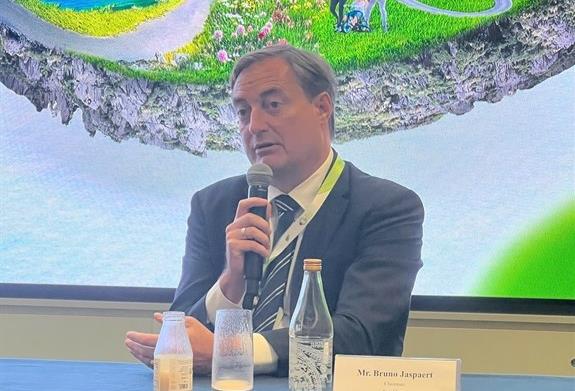Margaritis Schinas, vice president of the European Commission, and Bruno Jaspaert, chairman of EuroCham Vietnam, share their thoughts to the media on Việt Nam - EU relations and Việt Nam's road to green transition.

The 2024 Green Economy Forum and Exhibition was held in HCM City from October 21 to 23 for international businesses to promote green economy technologies and solutions, and discuss topics surrounding green transformation.
Margaritis Schinas, vice president of the European Commission, was in Việt Nam to attend the event. He and Bruno Jaspaert, chairman of EuroCham Vietnam, share their thoughts to the media on Việt Nam - EU relations and Việt Nam's road to green transition.
What are your general thoughts on Việt Nam - EU relationship?
Schinas: For us, Việt Nam is not just a simple partner, but a trusted partner. Someone we trust and someone whom we consider to be an anchor of stability in the region which often needs more stability and security than it can consume.
We feel very encouraged when we see our trade relationship with Việt Nam. Our trade volumes went up 40 per cent in the last four years. This clearly shows the depth and intensity of our bilateral relationship.
All this is very good but not enough. We need to do more, especially on two accounts. The first is the need to transform our free trade agreement into a comprehensive partnership agreement, a strategic partnership agreement which in a way would symbolise the upgrade of this partnership. I very much hope the Commission President Ursula von der Leyen will visit here in April, and by April this upgrade is completed.
The other part of our future collaboration clearly is green transition and the joint fight against climate change, biodiversity loss and natural disasters. Việt Nam is particularly exposed to these risks, in the same way Europe is exposed to these risks, and so we are very much committed in the years to come to broaden our co-operation with Việt Nam in these areas of green transition. This work has already started with some projects that we are already financing.
These are the pillars of our future corporation.
Việt Nam is entering a new era of development, aiming to become a developed country by 2045. What is Việt Nam's current status globally and possibly in the next 10 years?
Jaspaert: Is it possible for Việt Nam to achieve its targets? Yes.
But we should not be blind to the problems that a country in a developing stage like Việt Nam is facing. We are talking about environmental pollution, about rapid economic growth that sometimes is difficult to control, and people – you have a lot of people, but not everybody has the right skills – and you need energy. So there is a lot of work ahead.
Europe does consider Việt Nam a very important partner. We will go hand in hand, and try to help you achieve part of that growth ahead.
And I believe that if Việt Nam is doing something very well, it is making friends. I think Việt Nam probably has the most friends in the world at this moment!
Schinas: I would also say that Việt Nam needs investment, especially foreign investment. And this foreign investment should go into areas like energy, digitalisation, green technology, environment, and sustainable transportation.
Part of this investment can come from the European Union through our new flagship programme, which is called Global Gateway. Global Gateway is a major international development programme we have that can help our partners in the world invest in these areas.

Solar and wind power projects in Việt Nam are often located in rural, economically disadvantaged regions. Do you think local populations can participate in and benefit from these clean energy projects?
Schinas: I agree that people living in rural areas need more opportunities, more employment opportunities, to get better lives where they live instead of having to migrate.
And our investments, Global Gateway and other projects in rural Việt Nam have this job generating element integrated into them.
During my trip I am visiting these projects in the North, these hydroelectric projects and energy projects. And I want, with my presence on the ground, to pass also this message to the local population that we can do more for them through European investment.
‘Building green futures’ is a theme of this year's GEFE. What are the challenges for Việt Nam in building a green future?
Jaspaert: Today the biggest problem in Việt Nam is that your legal framework is not adapted to the zero carbon emission target the country has. There are many laws but they are not all in sync with each other and it takes time to get your framework correct. It takes time to make it suitable for investors to come to Việt Nam.
Việt Nam's energy is also very cheap. If you want to transition, unfortunately, it is very expensive. So Việt Nam faces difficult choices in the future: how to remain a rather cheap energy providing country and still transition. There is no easy solution.
China has for instance gone much further in the battle for green transition. Electricity prices in China are 30 per cent more expensive than in Việt Nam. Electricity prices for us in Europe are three times more expensive than in Việt Nam. So we will have to find a different pricing mechanism. — VNS





